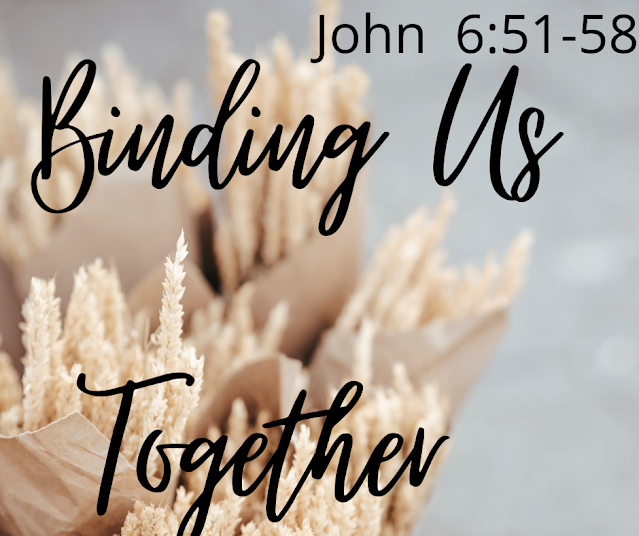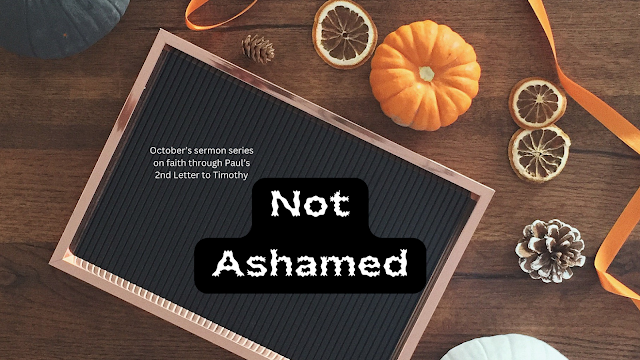Binding Us Together - John 6:51-58 (Ordinary 15B)
What’s the strangest thing you’ve eaten? I occasionally like to try new things. There’s been a list around Facebook that lists things like a snake, possum, or famously includes haggis for a few years. For those who don’t know, it’s a traditional Scottish dish, made of sheep’s heart, liver, and lungs, and among spices and other flavorings, but wrapped in the animal’s stomach like a casing for sausage. I don’t mean to turn your stomach so early in the morning, but that is something strange.
The weirdest thing that I have ever eaten is blood sausage. I spent Christmas in Norway about fifteen years ago, where it is a traditional dish to make for the holiday. Just even talking about it, I get the memory back. The family I was with waited in anticipation for my reaction and laughed when I didn’t have the nerve to finish. It has a strong flavor, and yet the spices still didn’t cover up the apparent blood taste.
Anyway - I digress. As much as this is not the best church conversation, we need to talk about our lectionary’s gospel text this week, John 6:51-58. This sermon will be the last part of the “Food and Faith” series, as we have traveled through what some others have deemed “the Summer of Bread” since there are many weeks devoted to this chapter in John.
We’ve been through Jesus feeding the multitude of followers - whether it was 5000 or ten thousand, we’ll never know. He wrestled with the folks who wanted to make him an earthly King, trying to share with them the divinity He possesses, to explain why He is here and everything that means for the world. Jesus has shown that he tends to our needs, like a good shepherd, and that he remains faithful in doing so.
JESUS IS MAKING ME UNCOMFORTABLE
As for today’s gospel reading - I don’t know about this “eating Jesus’ flesh and drinking his blood” stuff. This text, even in our modern age, seems shocking. It sounds way too strange for me, even very uncomfortable. On its face, it looks like Jesus is endorsing cannibalism. What?? No wonder Christianity turns people off! Who wants to think about eating a dead and buried guy who came back like a zombie?? I know that’s odd to say in a worship service, but the language is super weird. So rather than take time to learn about it, I’d like to think about something else. Something like majestic mountains, crashing seas, beautiful sunsets. Those are things that capture my interest. This conversation seems weird and out of the ordinary. But, friends, plenty of life has difficult discussions.
The Jews (especially leaders) in the audience - those who know about dietary laws from old texts in Genesis and Leviticus would have been appalled, even confused, at this assurance that the BLOOD of this man was the key to salvation! How much he is stressing that this blood and flesh is the hope of their people - this is absurd! Jesus is still speaking in metaphor, who are totally missing it. They’re asking questions that, three chapters earlier, when Jesus was talking about being born again - when you’re baptized by the water and the Spirit, were wondering how to enter and be expelled from the womb a second time. Those who are attached to his words want to figure out the meaning without context. They’ve lost the metaphor! Another quick note is that the verb “feed” is a better translation for “eating.” This change, seemingly subtle, speaks to benevolence and an offering to the people. It signifies God providing what the people need, and whether they take it is up to them.
Much like we talked about last week, Jesus is appealing to those who want a deeper relationship, more than educated belief, as if to create a place where their very survival depends on Him in every aspect of their lives. This passage could be a reference back to the Old Testament book of Deuteronomy, chapter 8, verses 2 & 3, as read from the Contemporary English Version, “Don’t forget how the Lord your God has led you through the desert for the past forty years. He wanted to find out if you were truly willing to obey him and depend on him, so He made you go hungry. Then he gave you manna, a kind of food that you and your ancestors had never even heard about. The Lord was teaching you that people need more than food to live - they need every word that the Lord has spoken.”
With Jesus being the human element of the Holy Trinity - these words are the flesh of God that we need to desire. We need not take the words of Jesus so literally, but we do need those words for survival. This concept was also introduced in the rest of the Gospel of John - at the start of Ch 1, verse 14, John writes, “the Word became flesh and lived among us.” As those who came after biblical times, we have the benefit of knowing that Jesus will give not only his bread but also his LIFE so that the world may live as God intends.
But how do we take that to a world that only sees flesh and blood, life and death? The journey that we’ve taken over the last few weeks is a play on the entire life of a Christian. Do you remember being a new Christian, and you were SO HAPPY you were being fed? You wanted more - like right after the miracle - those who witnessed couldn’t get enough, so they were running after Jesus. You followed, and after a while - you got used to it. Maybe the food didn’t fill you like it once did. Perhaps you realized that it was just empty, and you’d get hungry again. It didn’t seem as exciting as it once was. Maybe even after walking away, you came back and tried again, but it was different than what you remembered.
Jesus asks this of us. We are bound together as a faith community - not just as United Methodists but as believers in Jesus Christ. Whoever relies on the Son of God will be given eternal life. Jesus must be the center of our church as well - He cannot be just a “good guy” or “a teacher among many.”
BOUND TOGETHER WITH THE SPIRIT
Not only are we bound together with others in the community, But the Trinity BINDS with us - God, Jesus, and the Holy Spirit - in such an intimate way that there is no separating. As we digest flesh and blood, we break it down. Like everything else we consume, it becomes energy for our spiritual, physical, and emotional beings.
The Biblical language and its concepts can be challenging to understand. Be patient. Think about it. What if you were to think about how your body utilizes the food you consume. You try to eat a healthy diet - lots of fruits, veggies, proteins, etc. You want to get away from the fats and starches that could irritate your system. When the food breaks down into its blocks, it nourishes your body so that you can do so many things. When we take the empowerment of Jesus Christ into our lives, they become the very fibers of our being. Love manifests and nourishes our bodies. Our souls and spirits feast on the wondrous love of God and the incredible healing, restorative powers of the Holy Spirit. The joy of the LORD fills us. We have taken Christ thoroughly into ourselves, living with his happiness and peace in our hearts.
Other things can bind together - for example, in food. Some food can fall apart if it doesn’t have something to hold it together structurally. Much like when my wife makes meatloaf, she tells me that she adds an egg to help the loaf stay intact when serving. I wondered why this would work, so I did a little investigative work. It appears that when eggs are beaten & heated, the proteins in the eggs break apart but then get reconnected with the meat proteins, strengthening the overall structure of the loaf.
What can we learn from this, then? Under stress, we come unraveled; the structure around us can bind together and give us space to not fall apart. When the strength of those relationships is rooted in Christ, it’s just another ingredient to make your recipe delicious and robust.
I was reading through my latest issue of National Geographic. The title is “America’s Hunger Crisis” by Cassandra Spratling. It’s less about stats and figures about the need, which is plenty - but the richness comes in telling the stories of those affected from coast to coast. Reports from Detroit, Houston, rural Alabama, and West Virginia, where nonprofits and neighbors are taking up the cause for their people, and the article highlights what those communities are doing to tackle the need. The quote from the article that spoke the most to me is, “There is a paradox [of rural food insecurity] that the residents often live in areas where the very food they need is growing... It seems counterintuitive, but the thing is that because of the ways that the supply chains work for food, the people who live in areas that produce food, generally speaking, do not have access to that food.”
” Jesus uses shocking language in our text today, but I think he may be shocked that such needs ravage our communities. There seems to be a disconnect between production and distribution. Those who are growing the food do not have enough to survive, whether they’re workers in a rural location, immigrants in a meat processing factory, or those who may even be cooking or serving the lunch you might be thinking about. Jesus wants us to recognize that He is foretelling a shocking sacrifice - feeding on flesh and drinking of blood, but what he wants to make clear is that the sacrifice is not for him or about him; it is the glory of the one who sent him, those creations of the Great Creator, the images of God;
Here’s the thing - if you’re shocked by Jesus coming to redeem our lives despite being unworthy to the point of nearly being lost. If you cannot understand why Jesus came to feed those who couldn’t regularly be fed, then what is so amazing about God anyway? Why would any of us bind together with this eternal life that our savior offers for believing? WhaWhat’se point?
Friends, the point is that none of this is up to us! God has given the gift through His Son, Jesus Christ, and to His glory, we praise him. One thousand years ago, now, and everywhere in the future, God is already there. May we be shocked into realizing that grace was never about what we deserved but who God is. May we be bound into His heavenly family from now until glory takes us home.




Comments
Post a Comment